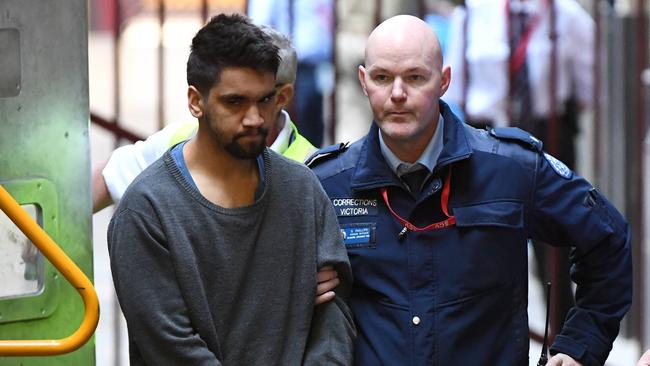Codey Herrmann to rely on ‘Indigenous disadvantage’ to fight DPP appeal over Aiia Maasarwe’s murder
Murderer Codey Herrmann’s “Indigenous disadvantage” will be central to defence submissions as they fight the DPP’s bid to lock him up for longer.

Police & Courts
Don't miss out on the headlines from Police & Courts. Followed categories will be added to My News.
The “Indigenous disadvantage” of killer Codey Herrmann will form the centre of defence submissions as they fight the state’s top prosecutor’s bid to lock him up for longer.
Director of Public Prosecutions Kerri Judd QC argues the 36-year sentence handed down to Aiia Maasarwe’s murderer was “manifestly inadequate”.
A five-judge bench will hear the appeal in March.
Court of Appeal president Chris Maxwell said the court would need more information regarding mitigating factors and moral culpability to understand Herrmann’s “appalling” crime.
He urged Herrmann’s barrister, Tim Marsh, on Thursday, to probe deeper into his arguments surrounding his client’s deprived background and Aboriginality.
“The field of indigenous disadvantage is one that white middle class judges don’t know much,” Justice Maxwell said.
“I don’t want you to think this is becoming an inquiry into indigenous disadvantage.
“This is the first time we are having a close look at this big and difficult topic.
“It will assist other courts.”
Justice Maxwell said they would need further references other than one sentence plucked from the renowned High Court ruling in 2013, which considered the impact of Aboriginality on sentencing for the first time in three decades in the case of William Bugmy, an Aboriginal man jailed over a brutal attack on prison guards in NSW.

The paragraph being relied on was: “An offender’s childhood exposure to extreme violence and alcohol abuse may explain the offender’s recourse to violence when frustrated such that the offender’s moral culpability for the inability to control that impulse may be substantially reduced.”
Justice Maxwell urged Mr Marsh to look to other countries, including New Zealand and Canada, where there are indigenous populations to find other relevant cases.
“One sentence from Bugmy is not enough — not when it is very important in a case like this and very important in criminal justice,” Justice Maxwell said.
Herrmann, 21, pleaded guilty to the rape and murder of Ms Maasarwe as she got off a tram and walked home in Bundoora on January 16.
Justice Elizabeth Hollingworth, who described the attack as “savage” and “unprovoked”, jailed him for 36 years, setting a non-parole period of 30 years.
The prosecution had pushed for a life term.
The experienced Supreme Court judge said she had taken into consideration his guilty pleas, lack of criminal history, youth, deprived childhood and severe personality disorder.
Ms Judd will argue too much weight was given on mitigating factors in light of the gravity of the offending.
But Mr Marsh said the sentence was within range because of Herrmann’s seriously disadvantaged and traumatic background.
Summarising the appeal case, Justice Maxwell said: “The director’s argument is all about the gravity of the offending — Mr Marsh’s submissions will be about deprived background.”
“It promises to be an important and quite challenging set of issues to investigate.”
The appeal is set down for March 18.





